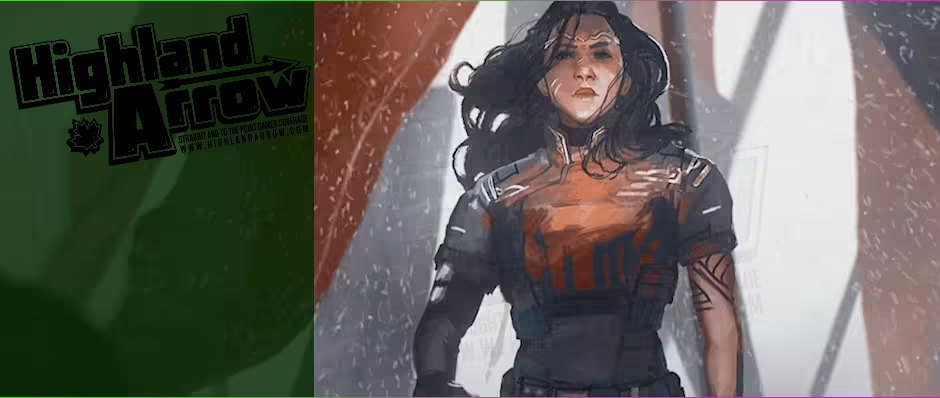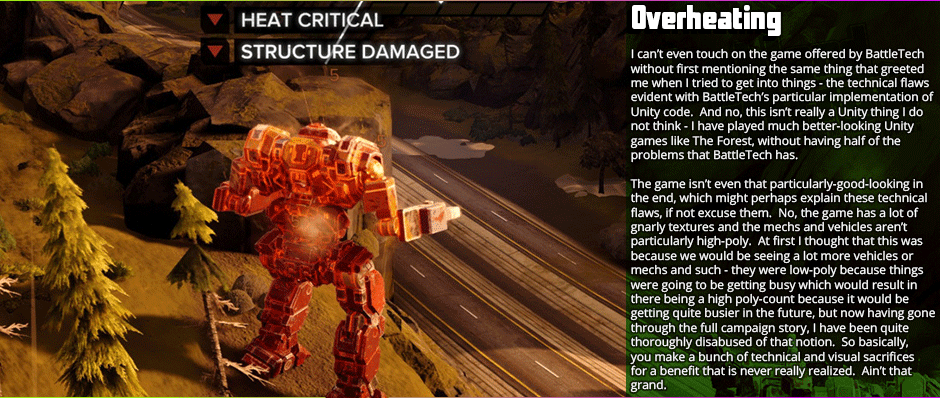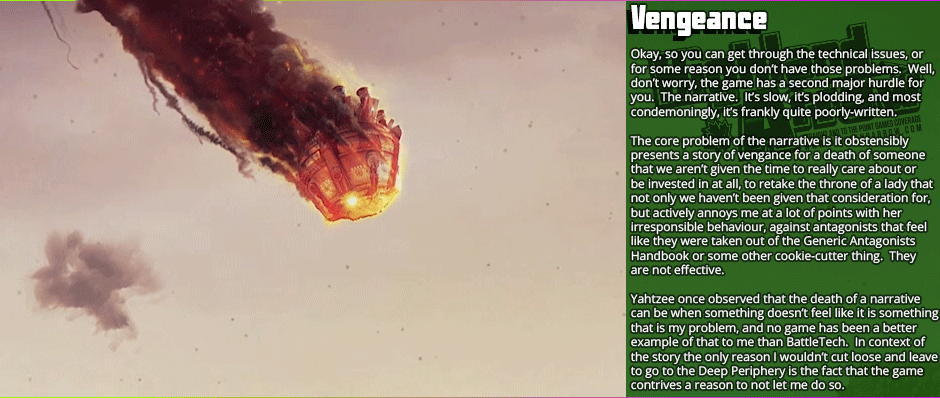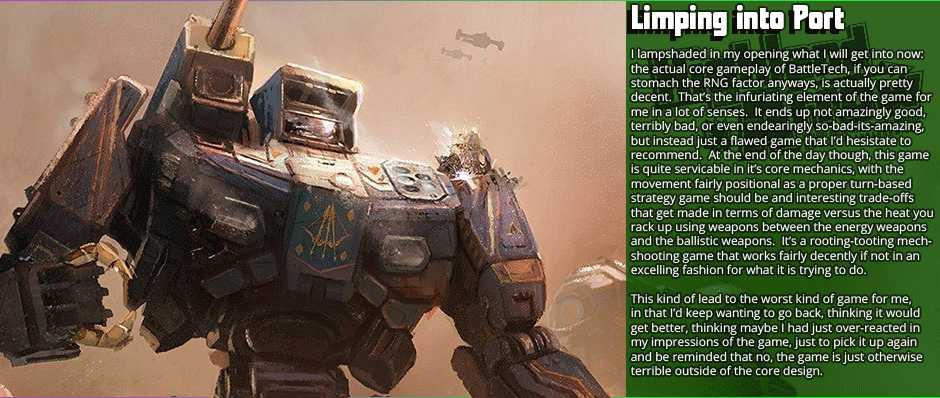

BattleTech
Single-Player Review
Platforms: PC, Linux, Mac
Reviewed on: PC
Reviewer: Maiyannah Bishop
Review Play-Time: 84h
Developer: Harebrained Schemes
Publisher: Paradox Interactive
Released: 2018-04-24
Review Published: 2018-07-22
Review Updated: 2020-04-06
+ Good core mechanics
+ Some decent art
- Intrusive DRM
- Constant stuttering and frame drops
- Almost complete lack of player agency
- Quite short campaign story length
- Poorly-written narrative that relies on happen-sance
- Aggressively-small amount of mechs you can field
- Very artifical difficulty
- Aggressively padded and time-wasting
- Grating soundtrack

BattleTech (often stylized BATTLETECH) is a tactics game designed by HareBrained Schemes and published by Paradox Interactive. As the name indicates, it's a rehash or less cynically, reboot of the classic tabletop strategy game on a modern video gaming system. I've played the BattleTech tabletop strategy game since I was a much younger lass and probably far too young to actually be getting into it, and here we are. I wanted to like this game a lot more than I ended up doing, and that just leaves me so very tired. Which I suppose is kind of to be expected, since this is a slow and ponderous game that drowns you in exposition and secondary presentation. That might be something I could find forgivable, if the story was great and the secondary presentation engaging, but this is essentially a game that I ended up alt-tabbing out during the enemy team's turns, because they took a good minute or two, there was nothing I could do to affect them, so I was basically just watching; watching a thing I didn't find very entertaining. I've said this before and it's become something of a litmus test for me personally when it comes to games: if I have to find some secondary means of entertaining myself while I'm playing a game, something obstensibly meant to entertain me, then that game has essentially failed in it's stated purpose.
I think that's the condemning thing for BattleTech to me personally: it's a functional game, and that is why it has its defenders whose enjoyment I'm not going to take away from them, but it is a slowly-paced, plodding functional game with an uninvolving story and lack of any feeling of tension or weight to the various missions. If you were looking for a just general yea or nay on this game, well, I'd suggest if you got it at all, to get it on a deep discount so that you're not blowing a significant amount of coin on a mediocre-at-best game with a bunch of technical issues. If not, well, let's get into the specifics then, shall we?
Hard on the Metal
One of the pervasive defensive arguments we get about these RNG-heavy games, is that they are not meant for "casual" gamers. They're "hard" games, meant for "good" gamers. It's the sort of elitism that helps some people sleep at night, I suppose, but it gets trotted out time and time again to defend games with very artificial difficulty. The thing about artificial difficulty is that it only really comes up as a talking point when you're doing it wrong. If your game has artificial difficulty, but it doesn't feel unfair, then it has been well-balanced enough people aren't really going to care that it is an artificial difficulty all the same. We see this all the time after all: boss fights in RPGs and MMOs rarely follow the same rules for the bosses as the players, often making them immune to many different tactics such as crowd-control abilities in lieu of making an AI clever enough to avoid them or use them against the players that would seek to harry them. XCOM in particular had a bad case of artificial difficulty in making there be certain ceilings to player rolls (which is why the numbers listed often lie to you), and giving the aliens advantages to their to-hit rolls you don't have.
So why mention this here? Well, this is a defense made in many a user and a few professional reviews of the game I saw when going through the internet to see if people were having the same technical problems as I was (spoiler alert for the discussion thereof below: they did). There was one particular review that sticks in my mind that read: "Perfect 'old timer' tactical strategy from the world of Battletech that is not easy on players and doesnt contain childish comic graphics and over the top colors... game is unforgiving and rewards player for skill". That couldn't be further from the truth, in my experience. There is no real skill to be had in this game, and lets break down why that is.
Firstly, most of the game relies on RNG. Any game that relies on random rolls is inherently removing the element of the skill from the various mechanics where the randomness is introduced. Put in simpler terms: the more random you make a given task's outcome, the less that task's outcome relies upon player skill. Everything from being able to navigate dangerous terrain, to dodge/evasion rolls, to whether ammunition explodes or not when the structure of a location containing it is hit, to whether you hit an enemy, comprises random roll after random roll. A good game gives you levers to push to control the randomness in those mechanics, and the player skill then is diverted not to fulfilling the actual tasks of those mechanics, but in understanding the mechanics such that you grasp what positive and negative effects can influence the result of the skill checks. Now, this actually has a fair bit of place in a more tactical or strategy-based game, since you want to focus on the over-arching stretegic thinking, rather than the player's ability to pilot the mech or gun down enemies, and I'm not arguing for the removal of the randomness in these elements. However, what you ultimately have in BattleTech is a system where the positive levers to modify rolls are so small that they end up providing negligible advantage, so you're more or less still operating within the margin of experimental error with the randomness. There never was a point where I felt that levelling up my MechWarriors gave me an advantage in terms of hitting enemies or more tactical flexibility. They certainly turned into chunky salsa just as quick when the game decided to rain Jagermechs on me for the fiftieth dreking time, that is for certain.
Secondly, any time that the game feels you would have too hard a time, it will perform the most phenonemal ass-pulls to ensure that the artificial difficulty isn't too difficult. It'll give you a mech out of the weight class, a special NPC, or some special consideration, to make sure that you can make it through. So if the game is basically actively cheating on your behalf, how can you feel that there's an accomplishment in getting through those missions? In fact for myself that often enjoys trying to get around these stupid artificial difficulties (friends can attest to me doing some of CO's most BS content, solo to boot), because my response to that is the kind of controller-gripping angry-that-gets-shit-done sort of determination, most of the time. BattleTech didn't engender that from me though, because there was little actual reward for doing well. Basicallly, your entire purpose was to avoid the failure state. The only reward for being particularly clever with your tactics is less repair time (assuming some shitty roll doesn't mess even that up.)
I wanted to touch on the point of the RNG problems first and foremost because while it's not as egregious as XCOM, it can be a very divisive thing in the gaming community, and the fact of the matter is that it is still notable enough here that trying to get through even with objectively good mechs and mechwarriors is still going to be a slog to get through many missions because the game will fuck with you regardless. There are plenty of gamers that would be turned off by this, to whom this particular point is a good thing to know, and it's probably going to be as far into the review they read. And more power to them, frankly, because they should be playing games they enjoy, not the ones they don't. For my part, as a person who came into gaming from role-playing games and wargames of old, I am not usually terribly bothered simply by the inclusion of dice stand-in mechanics in games, but when the RNG seems to punish you even when you're playing well, that undermines any feeling of skill having an effect on gameplay. BattleTech not giving you any better rewards for better play other than some occasional (and very rare) bonus objectives that give you a boost to the money you're getting usually so little you could be forgiven for not even noticing you accomplished those optional objectives, well, that becomes another nail in that particular coffin. If you are someone frustrated by punitive RNG in games, this is not the game for you.

It's not really that it is a bad-looking game per se: its quite functional really, just not really all that great-looking either. That's the crux of my complaint really: there's no real reason this game should be as chunky in it's poor framerate as it is. There are a bunch of frame drops that occur pretty frequently. I actually experimented a bit to try to figure out what it was which caused that to happen and I think I have it figured out at least in general terms. Unlike most games that seperate rendering from the game logic, so the game maintains a fairly stable frame-rate whilst it crunches on the game logic, BattleTech doesn't. The frame drops occur basically every time that BattleTech is crunching game logic - movement, hit chances, moving between sectors in the dual mode, going between UI screens, and so on. It's quite marked too - sometimes it would take up to a whole minute to get past the stutter, which with the machine I have is just bloody unforgivable.
The frame drops and stuttering-bordering-on-freezing could perhaps be forgivable if they were less frequent, but they're not the only technical problem the game has. Trying to play the game on Linux basically was just a crash-fest, and it's why I ended up playing on my Windows 7 PC even though I generally prefer to be the free software advocate and play a game with a Linux version on Linux when I can. It crashed so often that I playing it was just untenable and I have a feeling they didn't test it on that platform at all. It was just an incidental thing to add to the list to get more sales, or with that performance it's certainly the impression I had. The Windows 7 version wasn't free of crashes, but it was mostly playable - I only had a couple, myself, but reports of more frequent crashes are all over the Steam and GOG forums at least at time of writing. For my part, the consistent crash I had was when I spent too long in the refit screen, which certainly blunted a lot of the fun of the game. Building custom mechs is a lot of fun of this game, and probably a lot of skill ceiling in these mech games - finding that special sauce that is the proper balance of damage and heat sinking, movement and such. We'll get into the customisation itself later, but the game frequently chugged through using it, and it's hard to over-emphasise how much that really crimped my enjoyment of the game. Every item you remove or add, every time you make a change essentially, the game has to sit and have a think about it.
Of course, those are just the two most visible technical flaws, but there were others that I ran into. Probably the oddest one that stood out was that when I tried to play the game from the hospital bed I've been stuck in by way of a wireless mouse and keyboard and a TV screen, half (and oddly only half) of the audio in the game took on a really strange kind of half-reverb that sound like it was doing some sort of weird effect on the sounds and the voices that messed up when playing audio through speakers rather than headphones. But there were other things: terrible screen tearing even when with v-sync on, and both on the screen and on the monitor, mechs that would clip right through structures for reasons, an AI that would see you through solid objects, and a bunch of z-buffer clipping issues that thankfully are easy to miss, because they tended to be the kind that cannot be unseen once you noticed them.

So, let's expand on this as best as we can without spoiling everything, as much as I feel that I'd be sparing you the pain that is this tepid mediocre game by doing so. The story begins with you having gone through your mostly-meaningless character baground pre-amble, you're thrust into a training mission with the captain of the guard for the Aurigan Protectorate, which pretty much immediately goes wrong the moment you're out of the tutorial, with an usurper attempting and succeeding with an armed coup. The mission ends with what is supposed to be the heroic sacrifice of that trainer. We're supposed to care about that death, we're told that they are someone we care about; but we have known this guy for like ten lines of dialogue and I couldn't really care less when they get offed. Well actually that's a lie, I was a bit annoyed because it meant that I had to wait thirty seconds for the barely-animated cutscene to load to tell us something we already knew happened.
Nonetheless, you're more or less forced to eject through plot contrivance, and then the incumbent government is said to be dissolved since it appears the Lady-to-be dies in a dropship explosion, and if you like me predicted that death was about going to stick about as solidly as a plot point in the new Star Wars film, well have a gold star for predicting the entirely predictable plot point. The writing starts with a completely contrived but very easy to see coming plot point and it starts as it means to go on, honestly, because most of the other twists and turns in the brief and poorly-written plot.
This leads you onto the entirely-inconsequential story that is simultaneously overly-long and too fucking short. I am still somewhat bewildered that the game managed this, but somehow they did. This is a game story that takes way too long to say far too little. As a pertinent example, let me re-invoke as an example the cutscenes I mentioned prior; they are basically concept art with slightly moving bit or a few gaudy effects played over it while a narration plays over it. This alone is enough for many people who are disdainful of "walking simulators" to disclaim it, but I am not so quick to do so personally. Betrayer and Kholat used this kind of thing very effectively. The reason that works in these games and not and BattleTech is that they fit within the flow of the former games, but do not work in BattleTech's flow. When Kholat has us lapse into unconsciousness in the snowstorm to hear that narreation as it transistions to the new area, the narration is a part of that transistion, it feels natural, and comes at a point of falling action in the dialogue. Now, BattleTech is attempting to do this in a sense, by essentially having the cutscenes be summations of the result of the mission we just accomplished, but that's the problem - it's a narration basically in most cases reiterates things we already know, which only robs the player of any other feeling of agency.
Player agency is a big sticking point for me with this story. There's so many points where the game basically rubs your lack of agency in your face, by offering you the ability to protest unwise actions or things that would otherwise go against your best interests. So it's a story that acknowledges the flaws which it posseses, and then carries on irrespective of the fact. It was downright infuriating to me when there were several situations no mercenary outfit would ever get into unless they were trying to commit suicide that you can even voiciferously protest through the game's meaningless dialogue trees, mean nothing. This is a game where the player doesn't matter. You are an inconvinence, an afterthought, a conscession the story-writer must concede so that they can spew their tripe of a narrative onto you.
All of the above might have been forgiven, and indeed often is, if the story that we are presented with is engaging enough or interesting enough that we do not mind the lack of agency in our play thereof. Classic games like Planescape: Torment or the Half-Life series are ultimately quite linear stories in their main arc, however we do not tend to mind the linearity in a game when the story is strong. I would actually hesitate to say the story in BattleTech is bad, but it is at best mediocre, and this game for it's various problems in the presentation of the story, needed a lot stronger a story to be worth it's plodding pace, the lack of a believable illusion of choice, and the unlikeable principle protagonists. Unfortunately, what it got is a very bog-standard retake the throne sort of thing. What really stood out for me personally in all that however, is how much time the game takes to tell so few plot points. There's a handful of meaningful events in this story, and yet it took hours to tell them, and would take more if you weren't exploiting the economy to skip the grind like I was doing. It is like a stodgy treacle that goes down thick and yet leaves you hungry and unsatisfied.

Ultimately, every saving grace the game might present through these solid core mechanics is overridden by something other elements of the game get right. The mech customisation is made frustrating and tedious by crashes and the arbitrary time constraints that you get placed on doing anything with a mech. The shooting and fighting is stymied by an aggressively-bad RNG that makes it feel like you can be playing at the top of your game with an objectively-better force and you can still lose. The management elements of buying mechs, repairing and resupplying them, and keeping on the contracts your mercenary unit needs to survive, is stymied by an over-reliance on secondary presentation that drags the gameplay pace to a screeching, notable halt while I, at least, put the game on its time-passing mode and just watched videos on YouTube. I've said it once and I will say it again: when I am having to find entertainment for myself when I'm playing a game that's obstensibly meant to entertain or at least engage me, the game has fundamentally failed in it's primary objective.
Combat itself is mostly stymied by the secondary presentation, yes, and we'll get back into that with it's own point I think, but the technical issues also are quite a hedgehog in the old prostate, to say the least. The interface's problems often land you in situations where you are trying to click on a UI element and the game interprets it as you trying to move the currently-selected mech to the spot on the ground underneath that UI element, which given you have no undo action ability unless you count the load function, you are left in all kinds of frankly frustrating situations because the game misinterprets the player's intentions. Indeed, half the actual difficulty I ended up having in the fights was when I'd end up having mechs out of position and thus easily ganked because of that.
That's not the only problem the combat has, just the one that comes up the most for me personally. The game also has a bad habit of making these fights artificially difficult, by throwing mechs well above your weight class at you, only to give you some sort of ace up your proverbial sleeve so that this doesn't crush you. This is something the game does mostly because it's the one way the missions can be made difficult when the AI is dumb as a sack of bricks. Most onerously and hilariously, I recall having what was supposed to be an epic and challenging boss fight with one of the principal antagonists that ended quite uncerimonously when they attempted to do a death from above attack on one of my mechs. For the uninitiated, a death from above attack is when a mech with jump jets uses that jumping ability to jump on top of a mech, which usually deals massive damage to the target, but also has a good chance of ruining your own legs. And well, said boss mech was so badly damaged when it did so that the damage it sustained from the DFA attack was enough to destroy it. You have to love it when the enemies kill themselves for you, but it does nothing to enforce the notion that the enemy is some sort of cunning and powerful force that managed an elaborate coup.
Even with the many "gimmies" the game affords you to surmount the artifical challenges it presents, it still demands you engage a fair bit in the customisation of mechs aspect to be able to fight well in the later missions. This is done through a refitting screen that is very reminiscient of the Mech lab from the old MechWarrior games of yore - nostalgia we all know that HareBrained schemes was banking on, but the aforementioned frequent crashes in this screen made the process laborious at best. Also adding to the drawn-out-nature of customisations is that any modification at all to the mechs take time, and that means you're just passing the time in the game. This is supposed to create an element of danger in upgrades or modification, because every month you have to pay out your expenses. So you don't want to just sit passing time. The problem is when you're late enough in the game to need refitting, this is pretty much a non-issue. Even playing the game legitimately, avoiding exploiting the very-exploitable economy as I did in my firsdt playthrough, you're not really going to be starved for cash at any point such that this would become a concern. So it's a pressure that exerts no pressure, and only serves to pad out the game's play-time and waste your own time as a player, as you watch time for the mech customisations tick over. Compounding this problem smartly is the fact that they happen in sequence. You can perform only one customisation at a time even when you've done all the management upgrades, so get used to wasting a lot of your time on these customisations.
The management side feels like a concession to XCOM players more than anything, and frankly feels somewhat tacked on as padding in the sense that I mention above. I really felt like this was ultimately serving two purposes: to try to overcome the feeling that the player had no agency in the story by providing them a distraction from this in the management section, and to lengthen the game even more. With the amount of padding that is in this game, I find it difficult to believe the developer weren't trying their best to try to rope people in at least past the Steam refund watershed period, and the scummy feeling that impression left has no doubt coloured my views on the game significantly negatively. But even without that element, the first purpose doesn't much work either. It essentially has two management elements: you pick upgrades to make on your dropship, and you pick which missions to undergo. And since the upgrades are all objectively better, and they are offered in a slow linear unlock scheme, this aspect of the game becomes an over-wrought and tedious mission select screen. One can argue MechWarrior training is a third element to the management side of the game, but I'd tend to disagree because it's just the jumpship upgrades repainted. MechWarriors have one of four upgrade trees that offer advantages, you can only ever mix two and get the special bonuses from said, and it suffers from the classical RPG problem with class-mixing in that attempts to get fancy and mix classes that are presented, just ends up making a sub-optimal mechwarrior. You have to specialize to be the most effective, and since there's four classes and you can only field four mechs at any given time, the decision is basically made for you already, it's just presenting an unconvincing illusion that you still have that choice.
Not exactly Solaris
Circling back to the point of secondary presentation - the game loves to shove it's art and cutscenes down your throat, it really, really does. Every move results in you watching the mech walk to that location. Every single one. Every action has a mechwarrior quip about it. Every story mission has a pithy cutscene with barely any animation to tell you what you just saw happen, did indeed just happen. I have mentioned this a couple times now, but that does not nearly come close to the amount of repetition you find in BattleTech.
What makes all this grating, at the end of the day, is that none of this looks at all amazing, or even good, hell I might have settled for 'borderline passable'. That's not to say the cutscenes are bad, they're just unneccesary, but the rest of this is clunky at best and downright appaling at the worst of it. In fact, one particularly humourous element to me is that even the fans of the game were so frustrated with the movement animations that you content with so frequently, that they discovered a way to break into the developer tools of the game using a game option, and yes indeed, one of the prominent playtesting tools is a way to fastforward these animations, which to me seems to indicate even the developers considered that animation time-wasting. Which while hilarious, begs the question of why they didn't remove them or at least tone them down. One can only speculate.
Oh, and as an aside before I get into my final thoughts, there will not be a multi-player review of this game, because despite GOG's promise of DRM-free games, it hosts one with a DRM - this game you cannot play online or receive your pre-order bonuses unless you activate the game's DRM that it ships with. Oops. As part of HLA's stance on such DRM, we're not rewarding it, and I certainly aren't making exceptions for this game. Paradox has been shoving account-based activation DRM in all it's games recently, actually with even more intrusiveness than Ubisoft manages with UPlay in a feat I would have found impossible if I hadn't been witnessing it myself. If you want to avoid games with digital handcuffs built in, this one is strongly on the avoid list.


